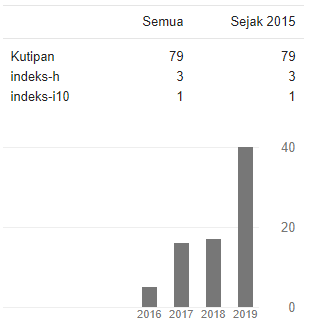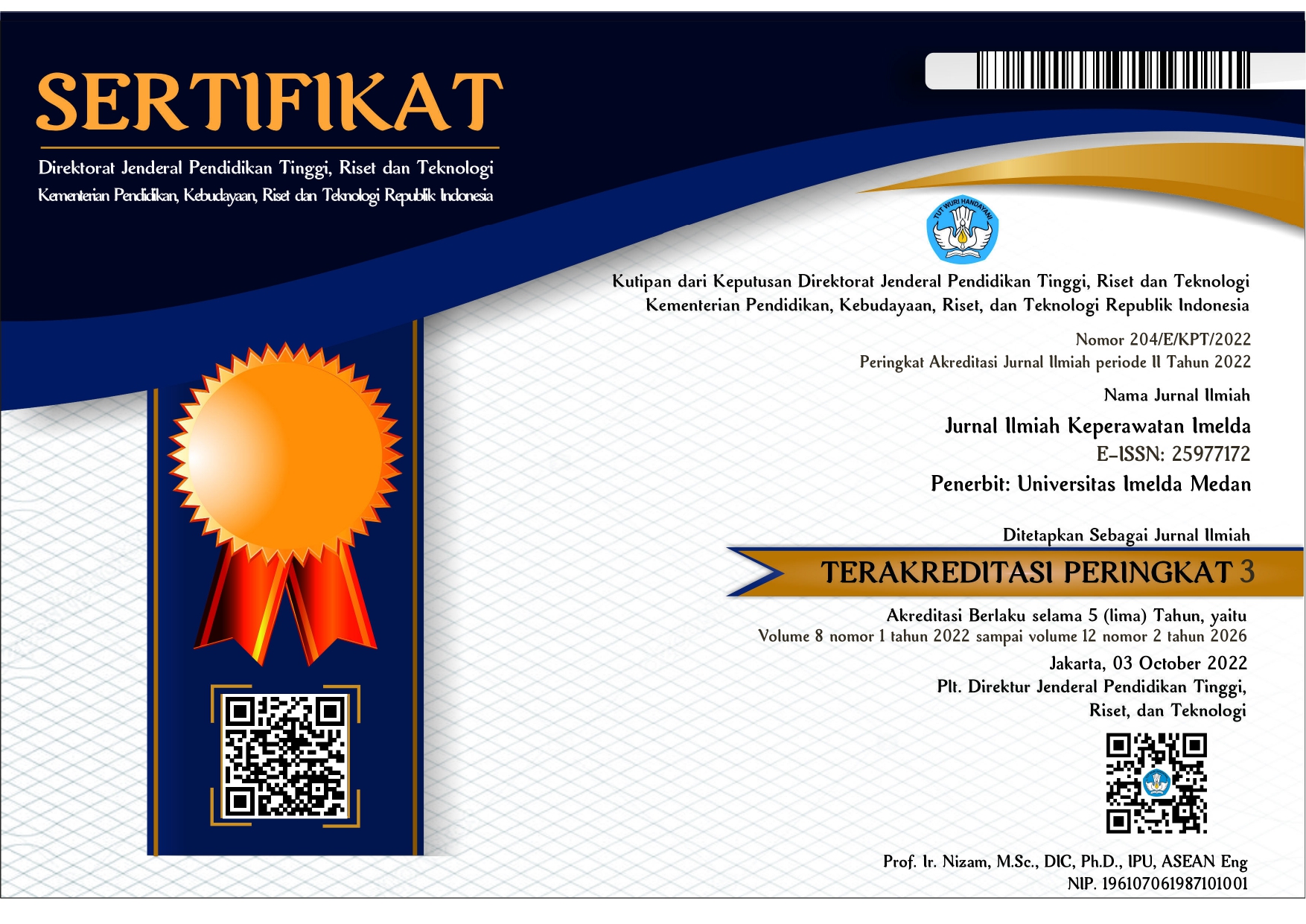PENGARUH TERAPI SYUKUR DALAM MENINGKATKAN KUALITAS HIDUP PASIEN TERINFEKSI HIV
DOI:
https://doi.org/10.52943/jikeperawatan.v10i2.1585Keywords:
Intervensi Rasa Syukur, HIV, Kualitas HidupAbstract
Background: Quality of life remains an important concern for people living with HIV/AIDS (PLHIV). The challenges experienced have a major impact on their well-being, including psychological aspects. This study aims to evaluate the effectiveness of gratitude therapy on the quality of life of PLHIV. Methods: This study is a pre-experiment with a total of 30 subjects at RSPI Prof. Dr Sulianti Saroso. The sample selection method is purposive sampling with inclusion criteria of adult ODHIV (age >18 years) and actively visiting RSPI Prof. Dr. Sulianti Saroso to take antiretroviral (ARV) drugs every month, while the exclusion criteria are pregnant women. Subjects will undergo gratitude therapy for six weeks. Gratitude therapy was measured with gratitude inventory instrument and quality of life with WHOQOL-HIV BREF instrument. Significant changes in average quality of life scores before and after gratitude therapy with Wilcoxon test. Results: The majority of participants were male (70%) with a median (IQR) age of 39.6 (26-52) years. After subjects received gratitude therapy, there was a significant improvement in quality of life, with a mean difference of 4.00 (95% CI: 3.00-5.65; SE 0.693; p-value <0.001) and an effect size measured by biserial rank correlation of 1.00. Conclusion: The findings of this study indicate that gratitude therapy has a significant and positive impact on improving the quality of life of PLWHA. Gratitude is a necessity in fostering a positive outlook on life. Gratitude therapy can be a standardised form of service in hospitals. Future research with qualitative studies to determine the magnitude of its effect on the psychology of PLHIV.
Downloads
References
Adhiningtyas, N. P., & Utami, M. S. (2020). Gratitude Cognitive Behavior Therapy untuk Meningkatkan Kualitas Hidup pada Perempuan dengan HIV/AIDS. Gadjah Mada Journal of Professional Psychology (GamaJPP), 6(1), 92. https://doi.org/10.22146/gamajpp.54234
Boggiss, A. L., Consedine, N. S., Brenton-Peters, J. M., Hofman, P. L., & Serlachius, A. S. (2020). A systematic review of gratitude interventions: Effects on physical health and health behaviors. Journal of Psychosomatic Research, 135, 110165. https://doi.org/https://doi.org/10.1016/j.jpsychores.2020.110165
Cardona, L., Barreto, M., Grodberg, D., & Martin, A. (2021). Cognitive-behavioral therapy training for multidisciplinary inpatient psychiatric teams: A novel curriculum using animated simulations. Journal of Child and Adolescent Psychiatric Nursing : Official Publication of the Association of Child and Adolescent Psychiatric Nurses, Inc, 34(3), 181–190. https://doi.org/10.1111/jcap.12318
Dejman, M., Ardakani, H. M., Malekafzali, B., Moradi, G., Gouya, M. M., Shushtari, Z. J., Alinaghi, S. A. S., & Mohraz, M. (2015). Psychological, Social, and Familial Problems of People Living with HIV/AIDS in Iran: A Qualitative Study. International Journal of Preventive Medicine, 6, 126. https://doi.org/10.4103/2008-7802.172540
Effendy, E., Amin, M. M., de Vega, L., & Utami, N. (2019). The Association between CD-4 Level, Stress and Depression Symptoms among People Living with HIV/AIDS. Open Access Macedonian Journal of Medical Sciences, 7(20), 3459–3463. https://doi.org/10.3889/oamjms.2019.446
Fauk, N. K., Gesesew, H. A., Mwanri, L., Hawke, K., & Ward, P. R. (2022). HIV-related challenges and women’s self-response: A qualitative study with women living with HIV in Indonesia. PLOS ONE, 17(10), e0275390.
Fekete, E. M., & Deichert, N. T. (2022). A Brief Gratitude Writing Intervention Decreased Stress and Negative Affect During the COVID-19 Pandemic. Journal of Happiness Studies, 23(6), 2427–2448. https://doi.org/10.1007/s10902-022-00505-6
Hemayatkhah, M., Rahmanian, V., Rahmanian, K., & Haghdoost, A. (2019). Population Size Estimation of Groups at High Risk of HIV/AIDS in Men, Using Network Scale Up in South of Iran, 2017. Journal of Isfahan Medical School, 36(512), 1662–1669. https://doi.org/10.22122/jims.v36i512.11086
Koch, L., Bertram, H., Eberle, A., Holleczek, B., Schmid-Hopfner, S., Waldmann, A., Zeissig, S. R., Brenner, H., & Arndt, V. (2014). Fear of recurrence in long-term breast cancer survivors. Psycho-Oncology, 23(5), 547–554. https://doi.org/10.1037/hea0000400.Effects
Lam, A., Mayo, N. E., Scott, S., Brouillette, M.-J., & Fellows, L. K. (2019). HIV-Related Stigma Affects Cognition in Older Men Living With HIV. Journal of Acquired Immune Deficiency Syndromes (1999), 80(2), 198–204. https://doi.org/10.1097/QAI.0000000000001898
Moore, D. A., Nunns, M., Shaw, L., Rogers, M., Walker, E., Ford, T., Garside, R., Ukoumunne, O., Titman, P., Shafran, R., Heyman, I., Anderson, R., Dickens, C., Viner, R., Bennett, S., Logan, S., Lockhart, F., & Thompson Coon, J. (2019). Interventions to improve the mental health of children and young people with long-term physical conditions: linked evidence syntheses. Health Technology Assessment (Winchester, England), 23(22), 1–164. https://doi.org/10.3310/hta23220
Oguntibeju1. Oguntibeju OO. Quality of life of people living with HIV and AIDS and antiretroviral therapy. HIV AIDS (Auckl). 2012;4:117-124. doi:10.2147/HIV.S32321, O. O. (2012). Quality of life of people living with HIV and AIDS and antiretroviral therapy. HIV/AIDS (Auckland, N.Z.), 4, 117–124. https://doi.org/10.2147/HIV.S32321
Pinninti, N. R. (2006). UK); Kelly Thompson, RN, BSN Topics in Advanced Practice Nursing eJournal. 6(3).
Pratiwi, I. N., Purwaningsih, & Ramahwati, S. (2019). The correlation between family support and quality of life in mothers with positive HIV in Surabaya. Indian Journal of Public Health Research and Development, 10(8), 2703–2707. https://doi.org/10.5958/0976-5506.2019.02278.2
Safarzadeh Jahromy, H., Hemayatkhah, M., Rezaei Dehnavi, S., & Rahmanian, V. (2021). Experiences of People Living with HIV (PLHIV) in Jahrom, Southern Iran: A Phenomenological Study. International Journal of High Risk Behaviors and Addiction, 10(2), e108414. https://doi.org/10.5812/ijhrba.108414
Scott-Sheldon, L. A. J., Balletto, B. L., Donahue, M. L., Feulner, M. M., Cruess, D. G., Salmoirago-Blotcher, E., Wing, R. R., & Carey, M. P. (2019). Mindfulness-Based Interventions for Adults Living with HIV/AIDS: A Systematic Review and Meta-analysis. AIDS and Behavior, 23(1), 60–75. https://doi.org/10.1007/s10461-018-2236-9
Sztachańska, J., Krejtz, I., & Nezlek, J. B. (2019). Using a gratitude intervention to improve the lives of women with breast cancer: A daily diary study. Frontiers in Psychology, 10(JUN), 1–11. https://doi.org/10.3389/fpsyg.2019.01365
Tanoue, H., Yoshinaga, N., Kato, S., Naono-Nagatomo, K., Ishida, Y., & Shiraishi, Y. (2018). Nurse-led group cognitive behavioral therapy for major depressive disorder among adults in Japan: A preliminary single-group study. International Journal of Nursing Sciences, 5(3), 218–222. https://doi.org/10.1016/j.ijnss.2018.06.005
Utami, M. S., Shalihah, M., Adhiningtyas, N. P., Rahmah, S., & Ningrum, W. K. (2020). Gratitude Cognitive Behavior Therapy (G-CBT) to Reduce College Students’ Academic Stress. Jurnal Psikologi, 47(2), 137. https://doi.org/10.22146/jpsi.43730








